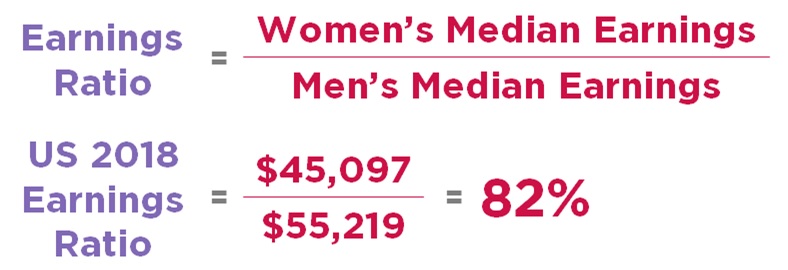
Read Article

The gender pay gap is the difference between what men and women are paid. It is computed as the median annual pay of all women who work full-time and year-round, compared to the pay their counterpart male workers receive. Other estimates are based on hourly rates.
The US Census Bureau’s 2018 annual income data recorded the gap in the world’s largest economy as follows:

The above means that for every dollar a man earns, the woman only earns 82 cents.
In the Philippines the data I gathered is from the agricultural sector using daily rates:

For every peso the Filipino agricultural worker earns, the Filipina counterpart earns 92 centavos.
The two ratios show that Filipinas are in a better place when it comes to gender equality. In global statistics Korea is listed as the country with the widest gender pay gap with a ratio of 65%!
Why is there a gap?
The gender pay gap is a result of various factors and most are systemic. To understand this issue, it is important to look at our labor history. The woman was in charge of the home – both its upkeep and child-rearing - and there is no income reflected in the work performed at home. Employers generally prefer to hire male workers as they will not take maternity leaves and are less likely to take other parenting-related leaves. Because of the traditional family set-up where the husband is the breadwinner and the wife is the homemaker, society in general, is more willing to give higher salaries to male employees. Moreover, on the employees’ part, females are also less likely to negotiate their salaries. (READ: When Wife Earns More Than Her Husband)
This matter has been of interest to me such that during our company Christmas party, I wore the “gender pay gap costume!” Our millennial and gen z employees suggested a party theme of “Social Issue.” So while others came in water crisis, environmental issues, poverty, kidnapping, etc., this is how I came in.

The author in Gender Pay Gap Costume. Left side shows the female side earning 80 cents. Right side shows the male side earning 1 dollar. The number 202 stands for something that you will find out as you read this article.
Can we close the gap?
There have been growing clamors and intensified discussions about closing the gap because everyone was alarmed with the data released by the World Economic Forum (WEF) in December 2018. According to WEF findings, at the rate we’re going it will take us not just decades but centuries to close the gap, 202 years to be exact!
Melinda Gates, co-chairman of the Bill & Melinda Gates Foundation, has committed one billion US dollars to promote gender equality.
Society is making deliberate efforts to narrow and eventually close the gap. We see the following steps being taken.
While we wait for the societies worldwide to address the systemic causes of the gender pay gap, here are some things that you and all women out there can do now to mitigate the adverse effects of this gap.
Chances are we will not live to see the gender pay gap closed in our lifetime. Moreover, our life expectancy is longer than our male counterparts, so we really have to hone our FQ (Financial Intelligence Quotient).
Do you already have a system that automatically sets aside your savings and investments for your old age? Are you protected in case something happens to you? Do you have dependents still counting on you financially? Insular Life has several women-centric packages to choose from. Feel free to contact them by clicking here.
If you haven’t started your FQ journey yet, please click the link to take the FQ Test now. In the end, the antidote for the adverse effect of this gender pay gap is a high FQ!
*****************
Attributions:
2. Philippine daily wage rate source
*****************
Rose Fres Fausto is FQ Mom (FQ stands for Financial Intelligence Quotient). She was an investment banker turned full-time homemaker and now a writer and speaker on money and family. She’s a Gallup Certified Strengths Coach and Behavioral Economist, having trained under Dan Ariely, the Father of B.E. Richard Thaler, and recently completed a B.E. course at the Harvard Business School. She wrote bestsellers Raising Pinoy Boys, The Retelling of The Richest Man in Babylon (English and Filipino versions), FQ: The nth Intelligence. She has a weekly column in PhilStar.com and regularly contributes to other magazines.